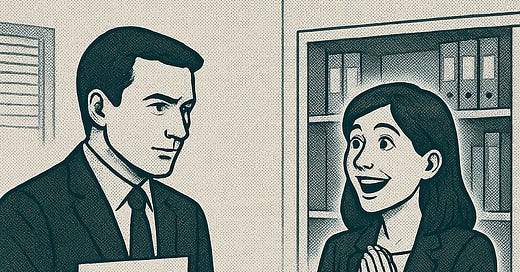👋 Hi, it's Greg and Taylor. Welcome to our newsletter on everything you wish your CEO told you about how to get ahead.
Two months ago, I brought Bobby Isaacson back to work with me - for the second time in our careers. I didn't post the job. I didn't ask HR to run a search. I just called him.
The same thing happened to me at Section. When I finally left my last founder/CEO gig at FirstUp, Scott Galloway called. He is one of my superfans (and not because I once loaned him a million dollars – a post for another day). Without him, I wouldn’t have had the opportunity to be CEO of Section.
This is the not-so-secret reality of hiring in today’s job market. Many positions that look “open to the public” are filled by someone the hiring manager has worked with before. And that means that cold-applying to a job has a very low success rate.
This will get even worse as AI ramps up. Salesforce, Shopify, and others have already said AI will slow down their hiring. Job openings are falling, which is dire news for the people still searching for work from the post-pandemic hiring binge/purge.
There are a few ways to get a job in today’s job market. But the easiest way, by far – know 3 people who would hire you again in a heartbeat. AKA, your superfans.
This post isn’t about making friends or about being universally liked. It’s about earning a few, high-value professional relationships that will pay off later in your career.
Here’s how to get re-hired … because you’ll need to.
Greg
How employers think about hiring
When someone is considering hiring you, they're making a calculation: percentage fit × unknown variables.
An unknown candidate with a great resume might be an 80% fit on paper. But they also bring unknown variables – they could be misrepresenting their experience, lazy, difficult to work with, not that smart, etc.
A known candidate might be a slightly-worse fit – maybe 70%. But they also have way fewer unknown variables.
This is why most hiring managers, when given the chance, prefer to work with people they know and trust. It's not favoritism. It's risk management.
The math is simple: 70% fit × 90% certainty > 80% fit × 50% certainty.
And by the way, all of this assumes your resume gets reviewed. For every position we post at Section, we get thousands of applicants – that number is 10x higher at well-known companies. Most resumes get filtered out by ATS systems or overwhelmed recruiters before a human ever sees them.
You need 3 superfans (not universal likability)
You don’t need to be universally liked to be re-hired. You’ll spread yourself thin trying to impress everyone equally – it’s exhausting and ineffective.
Instead, you need 3 superfans – people who would rehire you tomorrow without hesitation.
A superfan isn't just someone who thinks you're good at your job. They're someone who:
Sees your unique superpower (what you do better than almost anyone else)
Values that superpower disproportionately (it solves their specific pain points, or is a skill they personally lack)
Would fight to have you on their team again
These superfans need to either be in positions of power (your boss, your boss's boss, etc.) or on a leadership trajectory that will give them hiring authority in the future.
How to cultivate career superfans
Know your unique value proposition. What do you do better than anyone else? In the age of AI, this should be an outcome you drive, NOT an output you produce.
Find leaders who really value your superpower. Pay attention to who gives you substantive positive feedback, asks for your input unprompted, or goes out of their way to invite you to calls/projects/etc.
Align to goals you share. Find a goal that you share, and share the responsibility (both logistically and emotionally) with them. I love working with people who feel “all in” on a shared goal – people I can trust to carry the weight with me.
Become truly indispensable. Deliver exceptional results in areas that matter most to them. Make their lives at work measurably better or easier in ways they can clearly see.
Reduce friction to output. Nothing kills potential superfandom faster than being difficult to work with. Communicate clearly, solve problems proactively, and make collaboration with you feel effortless. Be the person who makes work less stressful, not more.
Be available when it counts. As we wrote in a previous newsletter, availability equals access. When your potential superfan reaches out, respond quickly. When they need something urgent, be the person who delivers without drama. This creates disproportionate impact on how they perceive your value.
The most obvious objection (and why it's wrong)
“Oh, so work is just a popularity contest.”
Yes, it is. But this isn’t middle school – you don’t have to be the most attractive and charming person. You just have to find bosses who see your value and leverage it to get better results.
My advice
A few last pieces of advice for building superfans:
Don’t take social signals as superfan signals. Someone might like hanging out with you – that doesn’t mean they’ll rehire you.
Look for evidence that their superfandom is worth something. If they’ve rehired people / brought teams with them in the past, that’s evidence they’ll do the same for you.
Ask. Know your status. Don’t assume the best. If you think you have a potential superfan, ask: “Would you hire me again? And if not, why not?”
Have a great week,
Greg



